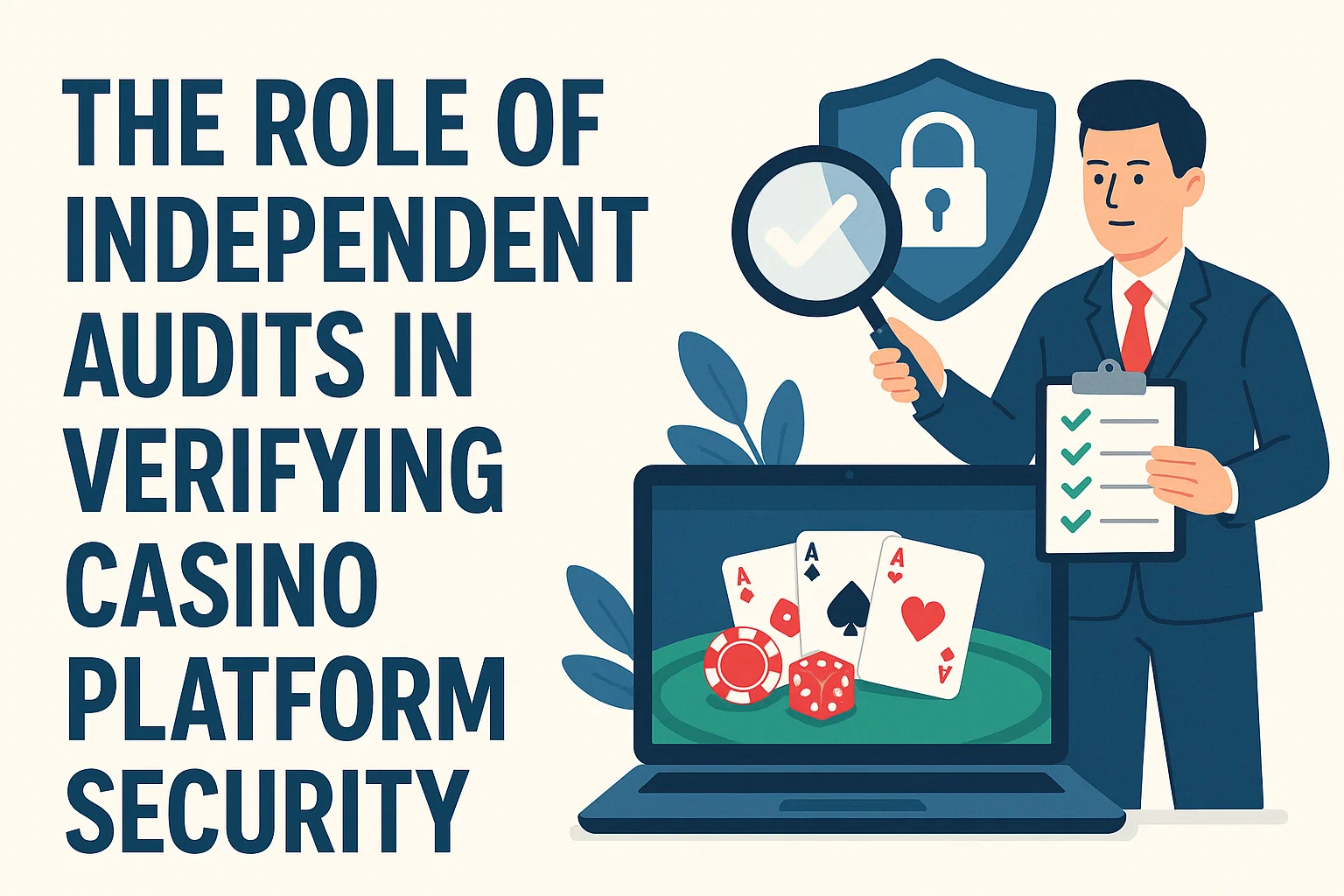The Role of Independent Audits in Verifying Casino Platform Security

The global online gambling market’s trajectory toward $127.3 billion by 2027 has fundamentally transformed security verification requirements across digital casino platforms. Independent audits have evolved from optional compliance measures to critical business enablers, with regulatory evaluation processes now including comprehensive checks for player protection policies, dispute resolution procedures, and compliance with Know Your Customer (KYC) requirements.
The strategic importance of independent security verification has intensified following high-profile industry breaches. International Game Technology’s recent cyberattack in November 2024, which forced the gambling technology vendor to take systems offline, demonstrates how security vulnerabilities can disrupt operations across global casino networks.
This analytical examination explores the multifaceted role of independent audits in verifying casino platform security, evaluating current regulatory frameworks, technical assessment methodologies, and emerging verification standards that define industry best practices in 2025.
Regulatory Framework Evolution: Compliance as Competitive Advantage
Mandatory Audit Requirements
The regulatory landscape for casino platform security has crystallized around comprehensive audit mandates. The UK Gambling Commission requires remote gambling operators to undertake third-party annual security audits against particular sections of ISO/IEC 27001:2022, with audit reports submitted within seven days if major non-conformities are identified.
Key regulatory developments include:
- Standardized Assessment Protocols: Compliance with data protection regulations such as GDPR is essential, with operators required to obtain explicit consent before collecting personal data and ensure secure storage for legitimate purposes only
- Mandatory Incident Reporting: Security breach disclosure requirements have become standard across major jurisdictions
- Continuous Monitoring Standards: Regular vulnerability assessments and ongoing security monitoring protocols
Jurisdictional Variations in Audit Standards
Different regulatory environments impose varying audit requirements, creating complex compliance matrices for international operators. Only six U.S. states permit online gambling, with crypto adding regulatory ambiguity under evolving federal rules, while offshore licenses cover 25% of platforms but 35% lack AML/KYC compliance.
The fragmented regulatory environment necessitates strategic audit planning that addresses multiple jurisdictional requirements simultaneously, often requiring operators to exceed minimum standards to maintain operational consistency across markets.
Technical Assessment Methodologies: Beyond Surface-Level Verification
Penetration Testing Integration
The Gambling Commission requires annual ISO 27001 security audits covering specific subsets of controls focused on access control, communications and operations, and software development. Professional security assessment has evolved beyond checkbox compliance toward sophisticated technical evaluation.
Advanced penetration testing methodologies include:
- Application Security Assessment: Comprehensive testing covering web applications, mobile applications, APIs and microservices, plus administrative panels supporting user-facing services
- Infrastructure Vulnerability Analysis: Network security testing, cloud computing security audits, and external infrastructure assessment
- Social Engineering Evaluation: Human factor security testing to identify operational vulnerabilities
RNG Verification Protocols
Random Number Generator testing represents a critical component of casino platform security verification. RNG audits provide independent evaluation ensuring numbers generated are truly random and unbiased, with algorithms confirmed to produce statistically random outputs.
Technical RNG assessment encompasses:
- Algorithm Analysis: Extensive testing using ‘diehard tests’ and ‘chi-squared tests’ to verify statistical unbiasedness in number sequences
- Compliance Verification: RNG testing requirements mandate demonstration that systems have been tested by independent and suitably qualified third parties, supported by documentary evidence
- Ongoing Monitoring: Regular testing processes with reviews and certifications dated and available for public viewing monthly on casino websites
Certification Body Ecosystem: Quality Assurance Standards
Primary Testing Organizations
The independent audit ecosystem centers around established certification bodies with specialized gaming industry expertise. Leading organizations include eCOGRA (eCommerce Online Gaming Regulation and Assurance), iTech Labs, and Technical Systems Testing (TST), whose certification signifies adherence to highest fairness standards.
Key certification providers maintain distinct specializations:
- Gaming Laboratories International (GLI): Comprehensive security auditing including penetration testing, network vulnerability scanning, and PCI compliance assessment
- ISO 27001 Certification Bodies: Accredited organizations providing audit and certification services, with teams composed of former Big 4 professionals delivering technical depth and streamlined processes
- Specialized Gaming Auditors: Industry-specific certification services focusing on customers scrutinized by regulators like Malta Gaming Authority and Division of Gaming Enforcement
Technical Competency Requirements
Professional audit teams hold certifications as ISO27001 Lead Auditors, ISO27001 Lead Implementers, Certified Information Security Managers, and Chartered Cyber Security Professionals. This specialized expertise ensures audits address both technical security requirements and gaming industry-specific challenges.
Multi-Layered Audit Approach: Comprehensive Security Verification
Financial Controls Assessment
External audits require casinos to have financial statements audited by independent public accountants ensuring reasonableness of accounts, while System and Organization Controls (SOC) 1 audits demonstrate commitment to robust financial controls and compliance.
Operational audit components include:
- Internal Control Evaluation: Assessment of policies and procedures for optimal efficiency and effectiveness
- Process Integration Analysis: Examination of interconnected departments including tables, machines, poker, betting, cash, and reception operations
- Risk Management Assessment: Evaluation of operational risks, calculation risks, work process risks, and technological risks
Data Protection Verification
SOC 2 audits provide effective demonstration of commitment to data protection and operational integrity, addressing the comprehensive data handling requirements facing modern casino operations.
Critical data protection assessment areas:
- Encryption Implementation: Verification of data encryption from collection through storage
- Access Control Systems: Multi-factor authentication and privileged access management evaluation
- Incident Response Capabilities: Assessment of breach detection and response procedures
Technology Integration Impact: Emerging Audit Challenges
Blockchain and Cryptocurrency Verification
The crypto gambling industry, valued at $250 million in 2024 and projected to reach $400 million by 2028, presents unique audit challenges with blockchain reducing costs by 40% via smart contracts.
Emerging audit considerations include:
- Smart Contract Security: Code review and vulnerability assessment for automated gambling protocols
- Cryptocurrency Transaction Monitoring: AML/KYC compliance verification for digital asset transactions
- Decentralized Platform Assessment: Security evaluation of distributed gambling applications
AI-Enhanced Security Monitoring
AI augments RNG systems through advanced analytical techniques and machine learning algorithms to monitor and verify randomness and fairness of game outcomes, with AI systems identifying patterns or anomalies indicating potential RNG process issues.
Advanced technology audit requirements encompass:
- Machine Learning Algorithm Verification: Assessment of AI-driven security and fraud detection systems
- Automated Monitoring System Evaluation: Continuous surveillance technology effectiveness measurement
- Behavioral Analytics Assessment: Player behavior monitoring system accuracy and privacy compliance
Business Impact Analysis: Strategic Value of Independent Verification
Trust Building and Market Positioning
Security and fairness assessments include evaluation of data encryption, independent game audits, fair bonus terms, and transparent payout practices, with platforms prioritizing transparency, fairness, and player protection.
Independent audit verification delivers measurable business benefits:
- Customer Acquisition Enhancement: Security certification visibility in marketing and platform positioning
- Regulatory Relationship Management: Proactive compliance demonstration reducing regulatory scrutiny
- Operational Risk Mitigation: Early vulnerability identification preventing costly security incidents
Competitive Differentiation Factors
Leading casino platforms emphasize that “security and fairness are at the heart of everything we do, with players’ trust meaning everything, which is why we go above and beyond with independent audits, responsible gaming tools, and top-tier encryption”.
Strategic differentiation through audit verification includes:
- Premium Security Positioning: Independent certification as premium service indicator
- International Market Access: Comprehensive audit compliance enabling multi-jurisdictional operations
- Partnership Enablement: Security verification facilitating B2B relationships and technology integrations
Quality Assurance Standards: Audit Effectiveness Measurement
Assessment Depth Requirements
Independent audits ensure website security and can be used when applying for gaming licenses, with most licensing authorities requiring casinos to meet specific security standards before license grants.
Comprehensive audit evaluation criteria:
- Technical Scope Coverage: Penetration testing determines effectiveness of data protection and cybersecurity protocols, identifying vulnerabilities in software, processes, and procedures
- Documentation Standards: Detailed reporting requirements ensuring audit findings support remediation planning
- Remediation Verification: Follow-up assessment confirming vulnerability resolution effectiveness
Ongoing Monitoring Integration
Online casinos engage in regular audits and compliance checks ensuring systems remain current against cyber threats, with independent organizations frequently assessing casinos to certify security measures meet industry standards.
Continuous improvement frameworks include:
- Regular Assessment Scheduling: Planned audit cycles addressing evolving threat landscapes
- Real-Time Monitoring Integration: Continuous security monitoring complementing periodic formal audits
- Performance Metrics Tracking: Quantitative measurement of security improvement over time
Future Audit Evolution: Emerging Verification Standards
Advanced Threat Assessment
Technological innovations for enhanced casino security include biometric identification, virtual and augmented reality training programs, and smart cards with RFID technology for comprehensive activity tracking.
Next-generation audit methodologies will address:
- Quantum Security Preparedness: Assessment of quantum-resistant encryption implementation readiness
- IoT Device Security: Evaluation of connected device security in integrated casino ecosystems
- Biometric System Verification: Security assessment of advanced authentication technologies
Regulatory Evolution Implications
The convergence of traditional financial auditing with cybersecurity assessment creates comprehensive verification frameworks addressing both operational integrity and digital security requirements. This evolution positions independent audits as strategic business enablers rather than compliance obligations.
Strategic Implementation Framework: Audit Program Optimization
Risk-Based Approach Development
Effective independent audit programs require strategic planning aligned with business objectives and regulatory requirements. The average duration of ISO 27001 penetration testing ranges between 5 and 30 person days, depending on assessment size and scope complexity.
Optimization strategies include:
- Scope Prioritization: Focus on high-risk areas and critical business functions
- Resource Allocation: Balance audit depth with operational efficiency requirements
- Stakeholder Integration: Align audit findings with business strategy and technical implementation
Vendor Selection Criteria
Organizations should be cautious with penetration testing providers offering “fast and cheap” assessments lasting only one to three days, as these are usually performed almost entirely using automated scanners without “hacker mindset” or creativity.
Professional audit partner evaluation criteria:
- Industry Specialization: Gaming industry experience and regulatory knowledge
- Technical Competency: Certified professionals with relevant security expertise
- Methodological Rigor: Comprehensive assessment approaches beyond automated scanning
Conclusion: Independent Audits as Strategic Security Foundation
Independent audits have evolved from regulatory compliance requirements into strategic security enablers that directly impact casino platform competitiveness and operational sustainability. The comprehensive verification frameworks now encompass financial controls, technical security, operational processes, and emerging technology integration.
The convergence of traditional auditing methodologies with advanced security assessment techniques creates robust verification systems capable of addressing complex, multi-jurisdictional operational requirements. Third-party auditors assess online casinos to ensure adherence to security standards and fair gaming practices, with this ongoing evaluation process crucial for maintaining integrity and safety of the online gambling experience.
Strategic implementation of independent audit programs requires understanding their role as business enablers rather than compliance obligations. Organizations that leverage comprehensive security verification gain competitive advantages through enhanced customer trust, regulatory relationship management, and operational risk mitigation.
The technical evolution toward AI-enhanced monitoring, blockchain integration, and quantum-resistant security measures will continue expanding audit scope and sophistication. AI-driven tools enable testing and regulatory bodies to automate verification processes for randomness and integrity of RNG systems, conducting extensive testing over vast datasets more efficiently than manual methods.
As the online gambling industry approaches the projected $127.3 billion market value by 2027, independent audits will remain fundamental to sustainable platform operation, regulatory compliance, and customer confidence maintenance. The organizations that recognize independent security verification as strategic investment rather than operational expense will maintain competitive positioning in an increasingly regulated and security-conscious market environment.
